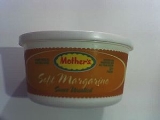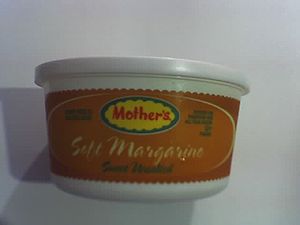
2008 Passover margarine shortage
Encyclopedia
During the 2008 Passover
season, kosher-for-Passover margarine
in the United States
was short in supply due to several issues, leading to a scramble among kosher consumers to obtain the staple since it features prominently in many Passover recipes.
One was the shortage of cottonseed oil
, the main ingredient in the product. Cottonseed oil is used in lieu of corn
or soybean oil
, the traditional bases for margarine, which are not permitted to Ashkenazi Jews
during Passover due to the laws of kitniyot
. Cottonseed oil is a byproduct of cotton; because of the demand for corn-based ethanol
, many farmers dropped their cotton crops in favor of more lucrative corn.
Additionally, some of the previous manufacturers of Passover margarine discontinued producing the product after deciding it was not economically feasible. The process of cleansing a margarine plant
to make it suitable for producing kosher-for-Passover margarine is complicated, and involves dismantling much of the equipment.
Some of the previous manufacturers felt it was no longer practical to undergo these procedures for a short-term project. Manischewitz
and Mother's, two of the largest kosher margarine brands, were only able to provide limited amounts to the marketplace, which were often not in the popular stick form.
 The margarine shortage had a large impact particularly on home Passover baking. Dishes which comply with Passover rules are often somewhat lacking in taste, and for this reason margarine is a key ingredient in many Passover recipes.
The margarine shortage had a large impact particularly on home Passover baking. Dishes which comply with Passover rules are often somewhat lacking in taste, and for this reason margarine is a key ingredient in many Passover recipes.
Often, no substitute is available.
Since the laws of kashrut
mandate the separation of milk and meat, margarine is an important butter substitute in recipes that are served with meat meals. Some of the recipes that require large amounts of margarine include Passover desserts, such as cookies.
Many stores rationed
the sales of margarine to customers by limiting the number of cases of margarine that could be purchased, and some stores required a minimum number of other items to be purchased..
Haolam, a large manufacturer of kosher cheeses, was able to produce margarine for Passover to meet some of the demands.
crackers were also in short supply for the 2008 Passover season.
Passover
Passover is a Jewish holiday and festival. It commemorates the story of the Exodus, in which the ancient Israelites were freed from slavery in Egypt...
season, kosher-for-Passover margarine
Margarine
Margarine , as a generic term, can indicate any of a wide range of butter substitutes, typically composed of vegetable oils. In many parts of the world, the market share of margarine and spreads has overtaken that of butter...
in the United States
United States
The United States of America is a federal constitutional republic comprising fifty states and a federal district...
was short in supply due to several issues, leading to a scramble among kosher consumers to obtain the staple since it features prominently in many Passover recipes.
Causes
There were several causes of the margarine shortage.One was the shortage of cottonseed oil
Cottonseed oil
Cottonseed oil is a cooking oil extracted from the seeds of cotton plant of various species, mainly Gossypium hirsutum and Gossypium herbaceum...
, the main ingredient in the product. Cottonseed oil is used in lieu of corn
Corn oil
Corn oil is oil extracted from the germ of corn . Its main use is in cooking, where its high smoke point makes refined corn oil a valuable frying oil. It is also a key ingredient in some margarines. Corn oil is generally less expensive than most other types of vegetable oils. One bushel of corn...
or soybean oil
Soybean oil
Soybean oil is a vegetable oil extracted from the seeds of the soybean . It is one of the most widely consumed cooking oils. As a drying oil, processed soybean oil is also used as a base for printing inks and oil paints...
, the traditional bases for margarine, which are not permitted to Ashkenazi Jews
Ashkenazi Jews
Ashkenazi Jews, also known as Ashkenazic Jews or Ashkenazim , are the Jews descended from the medieval Jewish communities along the Rhine in Germany from Alsace in the south to the Rhineland in the north. Ashkenaz is the medieval Hebrew name for this region and thus for Germany...
during Passover due to the laws of kitniyot
Kitniyot
Kitniyot, qit'niyyoth are a category of foods which are defined by Jewish law and tradition that Ashkenazi Jews avoid eating during the Biblical festival of Passover....
. Cottonseed oil is a byproduct of cotton; because of the demand for corn-based ethanol
Ethanol
Ethanol, also called ethyl alcohol, pure alcohol, grain alcohol, or drinking alcohol, is a volatile, flammable, colorless liquid. It is a psychoactive drug and one of the oldest recreational drugs. Best known as the type of alcohol found in alcoholic beverages, it is also used in thermometers, as a...
, many farmers dropped their cotton crops in favor of more lucrative corn.
Additionally, some of the previous manufacturers of Passover margarine discontinued producing the product after deciding it was not economically feasible. The process of cleansing a margarine plant
Factory
A factory or manufacturing plant is an industrial building where laborers manufacture goods or supervise machines processing one product into another. Most modern factories have large warehouses or warehouse-like facilities that contain heavy equipment used for assembly line production...
to make it suitable for producing kosher-for-Passover margarine is complicated, and involves dismantling much of the equipment.
Some of the previous manufacturers felt it was no longer practical to undergo these procedures for a short-term project. Manischewitz
Manischewitz
Manischewitz is a leading brand of kosher products based in the United States, best known for their matzo and wine. Founded in 1888 and under family control until 1990, it is the world's largest matzo manufacturer and one of America's largest kosher brands....
and Mother's, two of the largest kosher margarine brands, were only able to provide limited amounts to the marketplace, which were often not in the popular stick form.
Impact

Often, no substitute is available.
Since the laws of kashrut
Kashrut
Kashrut is the set of Jewish dietary laws. Food in accord with halakha is termed kosher in English, from the Ashkenazi pronunciation of the Hebrew term kashér , meaning "fit" Kashrut (also kashruth or kashrus) is the set of Jewish dietary laws. Food in accord with halakha (Jewish law) is termed...
mandate the separation of milk and meat, margarine is an important butter substitute in recipes that are served with meat meals. Some of the recipes that require large amounts of margarine include Passover desserts, such as cookies.
Many stores rationed
Rationing
Rationing is the controlled distribution of scarce resources, goods, or services. Rationing controls the size of the ration, one's allotted portion of the resources being distributed on a particular day or at a particular time.- In economics :...
the sales of margarine to customers by limiting the number of cases of margarine that could be purchased, and some stores required a minimum number of other items to be purchased..
Haolam, a large manufacturer of kosher cheeses, was able to produce margarine for Passover to meet some of the demands.
Other scarce items
In addition to margarine, Tam TamMatzo
Matzo or matzah is an unleavened bread traditionally eaten by Jews during the week-long Passover holiday, when eating chametz—bread and other food which is made with leavened grain—is forbidden according to Jewish law. Currently, the most ubiquitous type of Matzo is the traditional Ashkenazic...
crackers were also in short supply for the 2008 Passover season.

